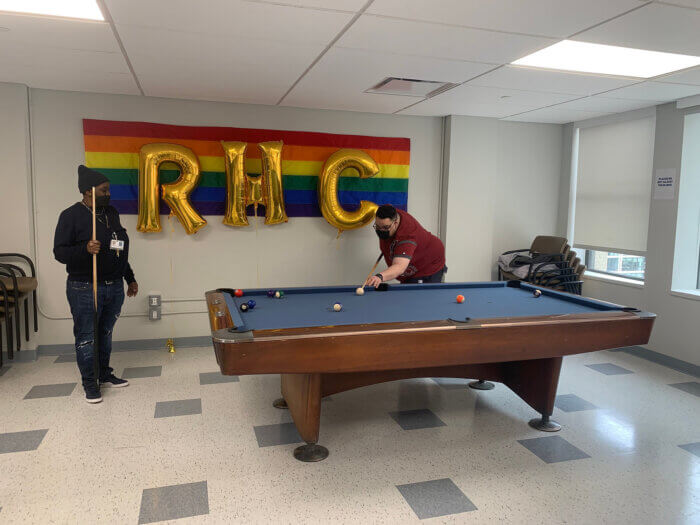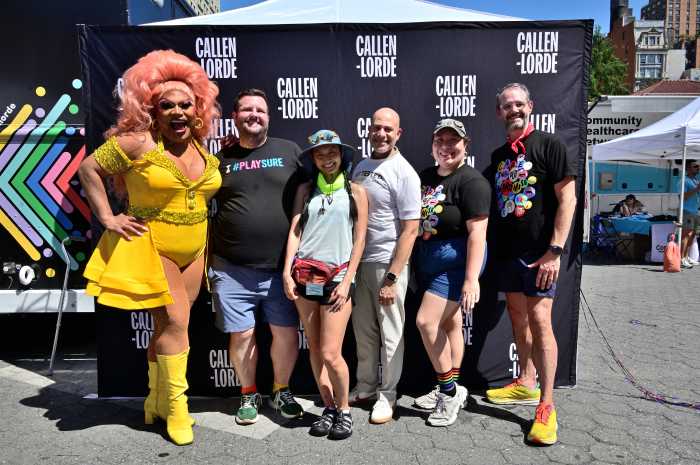People frequently weave in and out of a Brooklyn organization where individuals from all over the country, and even different parts of the world, gather under the mission of providing a “safe and supportive place where LGBTQ adults with mental illness can support each other and build their recoveries.”
The Rainbow Heights Club, located at 25 Elm Place in downtown Brooklyn, is primarily dedicated to combating the mental health crisis that is persistent in the LGBTQ community. They offer a range of services, from support groups to healthcare professional training, and in the process they aim to tackle mental health issues and combat negative stigma.
This is important when considering the origins of the club, according to Dr. Christian Huygen, the executive director of the Rainbow Heights Club.
Huygen was originally a playwright and actor, but later wanted to make significant change. So he went back to school to study clinical psychology after volunteering at an AIDS hospice in San Francisco. From there, he went into training to benefit the LGBTQ community, and that led him to what is now the Rainbow Heights Club.
“I was looking for places to have a training placement and there’s one clinic in Brooklyn that said they had an LGBT affirmative treatment center,” Huygen told Gay City News. “I went and did a year-long training placement there, and they had established themselves just three years earlier in 1996 as a public mental health clinic that was going to make sure that its staff was able to meet the needs of LGBT people living with mental illness, which is not something that even any journal articles had been written about at that time. It’s not an issue that people were thinking about. They weren’t thinking about the disparities that that population experiences. They weren’t thinking about the particular needs of that population, and they were not trying to meet them.”
From there, the staff at the clinic applied for a three-year contract to start a support program, which became the Rainbow Heights Club. Huygen was selected to be the director when the organization, and its longevity, first became a reality — and he has been there ever since.
The organization now offers in-person support services from 1 p.m to 6 p.m. five days a week for LGBTQ people diagnosed with a mental health disorder. From 10 a.m. to 1 p.m. they offer phone call support. One of their most praiseworthy aspects is that they have peer specialists, all trained, who are either a part of the LGBTQ community or have experienced the same issues that individuals coming in are struggling with, from substance abuse issues to their own mental health issues.
Rainbow Heights Club does not provide therapy or psychiatry; it is intended to offer support that is separate from those services.
“[Peer specialsits] really say something that most therapists and psychologists are not able or willing to say, which is, ‘I know exactly what you’re talking about. I’ve struggled with that too,’” said Huygen. “Which doesn’t mean ‘here’s exactly what you should do,’ but rather, ‘here’s how I face that challenge that you and I share.’”
Huygen also underscored the importance of embracing the good as well as the bad when it comes to support. Where instead of listing everything that is wrong, individuals coming in for help and support are also encouraged to detail their good days, where things went right.
“And that’s the essence of being what we call a strengths-based program, where we’re really interested not just in what all your symptoms are and what your illnesses are and what your problems are, but like, what are you good at? What do you hope for? What gives you joy? What are the things in your life that you want to keep going and keep building on?”
The Rainbow Heights Club is also working on developing consumer training and seeking out partnerships to further meet the needs of the broader community. Grace Gerber, a community engagement intern, said the organization is connecting with other clinics to facilitate dialogue around creating inclusive environments for clients.
“It’s another way in which we can expand our reach and coalition build with other organizations and service providers and create more partnerships,” Gerber said.

A safe and welcoming space is not only dictated by the services provided, but by the activities which bring communities together. Gerber spoke of museum trips, monthly birthday celebrations hosted by the organization for the community, and a talent showcase, which includes poetry readings, singing, lip syncing, and more.
During the pandemic, Rainbow Heights would call to check in on members of their organization to ask them about their well-being and if they were fully informed on the pandemic. Staffers would point individuals to soup kitchens and places where essential goods could be retrieved and needs could be met. They still worked with their clients and members over the phone, but the need for food, which was exacerbated during the pandemic, was what led to the emergence of a new program, Kitchen.
“We’ve been making home cooked meals for people, and they really love the feeling of all sitting down together and enjoying being nourished and supported and also enjoying each other’s company together,” Huygen said.
The Rainbow Heights Club has also been working to meet the needs of the community in the midst of a political climate that has been rapidly fluctuating, and not in favor of the LGBTQ community — such as addressing minority stress theory.
“For example, I’m a gay man,” Huygen said. “So if I hear that another gay man was attacked or killed, especially in my city or my neighborhood, I’m going to feel like that attack happened to me. I’m not just going to feel anxious. My body is going to start releasing stress hormones. My heart rate and blood pressure are going to go up. My stomach lining is going to start attacking itself. If I’m a member of multiple marginalized communities or identities, that’s going to increase the number of events or things that I hear about that might be impacting me in that very negative way.”
He continued, “But the flip side is if I know that I have a safe place where I can go and that people support and appreciate me there, and they let me be who I really am, I can learn to love myself. I can learn to build my resilience, and I can support other people who are in my situation so I can counter those kinds of negative, challenging things.”
Gerber noted that the Rainbow Heights Club is also increasing the number of training sessions for professionals and starting more important conversations on LGBTQ identities and affirming them. In fact, just last year, they trained 3,500 people.
Services provided by the Rainbow Heights Club are completely free, though individuals have to sign up to become a member. Information on how to sign up for services or donate can be found at rainbowheights.org.
Dr. Huygen offered a message for those interested in the Rainbow Heights Club, or those in need of help.
“We all deserve support and we all deserve help when we need it,” Huygen said. “I would hope that people feel comfortable reaching out and saying, I need some support… If you’re struggling, if you’re having a hard time, you deserve somebody saying, I hear you; that sounds really difficult, and I know what that’s like.”


































